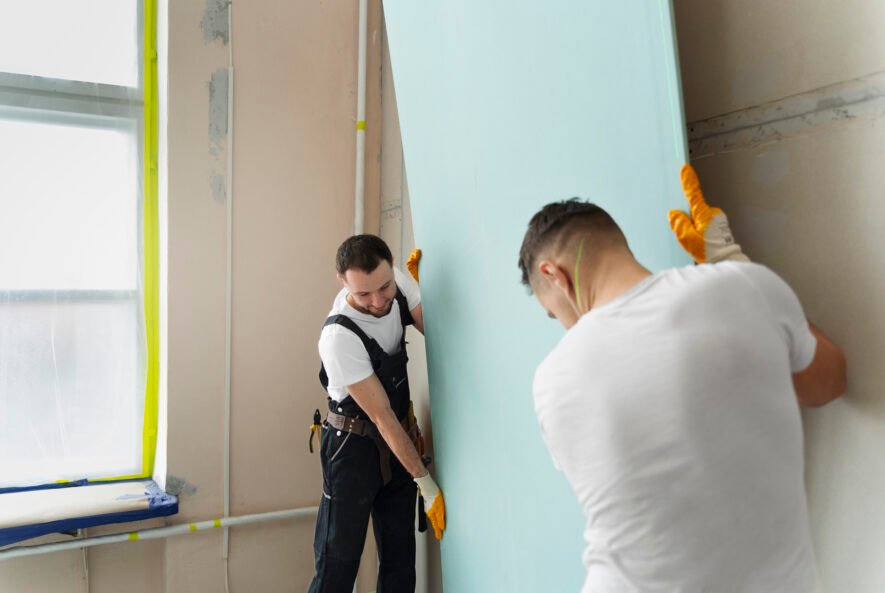
Noise pollution can disrupt your peace, whether it’s from noisy neighbors, traffic, or internal household sounds. Sound insulating a wall is an effective way to create a quieter, more comfortable home. At Eco Energy Upgrade, we provide expert soundproofing solutions tailored to UK homes. This guide explores how to sound insulate a wall, the best materials, and professional tips to reduce noise.
Why Sound Insulate a Wall?
Soundproofing a wall reduces unwanted noise, improving your quality of life. Benefits include:
- Enhanced Privacy: Block conversations and sounds from neighboring rooms or properties.
- Improved Comfort: Create a peaceful environment for work, sleep, or relaxation.
- Increased Property Value: Soundproofed homes are more appealing to buyers, especially in noisy urban areas.
- Energy Efficiency: Many soundproofing materials also provide thermal insulation, lowering energy bills.
Types of Noise to Address
Before sound insulating a wall, identify the type of noise you’re dealing with:
- Airborne Noise: Sounds like voices, music, or TV that travel through the air and walls.
- Impact Noise: Vibrations from footsteps, slamming doors, or appliances.
- Flanking Noise: Sounds that travel indirectly through floors, ceilings, or adjoining walls.
Each type requires specific soundproofing techniques, which Eco Energy Upgrade can assess and address.
Methods to Sound Insulate a Wall
There are several effective ways to soundproof a wall, depending on your budget, wall type, and noise level.
1. Add Mass to the Wall
Dense materials block sound waves. Install soundproof drywall, mass-loaded vinyl (MLV), or acoustic plasterboard over existing walls to reduce airborne noise.
2. Use Acoustic Insulation
Fill wall cavities with sound-absorbing materials like mineral wool, acoustic foam, or fiberglass. These materials trap sound waves, preventing them from passing through.
3. Decouple the Wall
Create an air gap between wall layers using resilient channels or soundproof clips. This reduces vibration and impact noise transmission.
4. Seal Gaps and Cracks
Sound leaks through tiny gaps. Use acoustic sealant or weatherstripping around edges, sockets, and baseboards to block noise.
5. Install Soundproof Panels or Tiles
Decorative acoustic panels absorb sound and enhance aesthetics, ideal for home offices or media rooms.
Best Materials for Sound Insulating a Wall
Choosing the right materials is key to effective soundproofing. Popular options include:
- Mass-Loaded Vinyl (MLV): A heavy, flexible material that blocks airborne noise.
- Acoustic Plasterboard: Thicker and denser than standard drywall, designed for soundproofing.
- Mineral Wool: Fire-resistant and excellent for absorbing sound in wall cavities.
- Acoustic Foam: Lightweight and effective for reducing echo and mid-frequency noise.
- Resilient Channels: Metal strips that decouple drywall from studs, reducing vibration.
Eco Energy Upgrade uses high-quality, eco-friendly materials to ensure long-lasting soundproofing results.
DIY vs. Professional Soundproofing
While DIY soundproofing (e.g., adding weatherstripping or acoustic panels) can help with minor noise issues, professional installation is recommended for significant noise reduction. Professionals at Eco Energy Upgrade offer:
- Expert noise assessments to identify sound sources
- Customized solutions for your wall type and noise issues
- Compliance with UK building regulations
- High-quality installation for maximum effectiveness
Costs of Sound Insulating a Wall
Costs vary based on wall size, materials, and labor. On average:
- DIY Solutions: £50–£200 for materials like acoustic sealant or foam panels.
- Professional Installation: £500–£2,000 for a single wall, depending on complexity and materials.
Soundproofing may also qualify for energy efficiency grants if combined with thermal insulation, which Eco Energy Upgrade can help you explore.
Tips for Effective Soundproofing
Maximize your sound insulation results with these tips:
- Combine methods (e.g., mass and decoupling) for better noise reduction.
- Address flanking noise by soundproofing floors or ceilings if needed.
- Choose materials with high Sound Transmission Class (STC) ratings.
- Consult a professional to ensure proper installation and compliance.
Why Choose Eco Energy Upgrade?
Eco Energy Upgrade specializes in soundproofing and insulation solutions for UK homes. We offer:
- Free noise and wall assessments
- Tailored soundproofing plans for your home
- Eco-friendly, high-performance materials
- Certified installers ensuring quality and durability
Create a Quieter Home Today
Don’t let noise disrupt your life. Sound insulating a wall can transform your home into a peaceful sanctuary. With Eco Energy Upgrade, you’ll get expert advice, quality materials, and professional installation to reduce noise effectively. Contact us today for a free consultation and start enjoying a quieter, more comfortable home!
